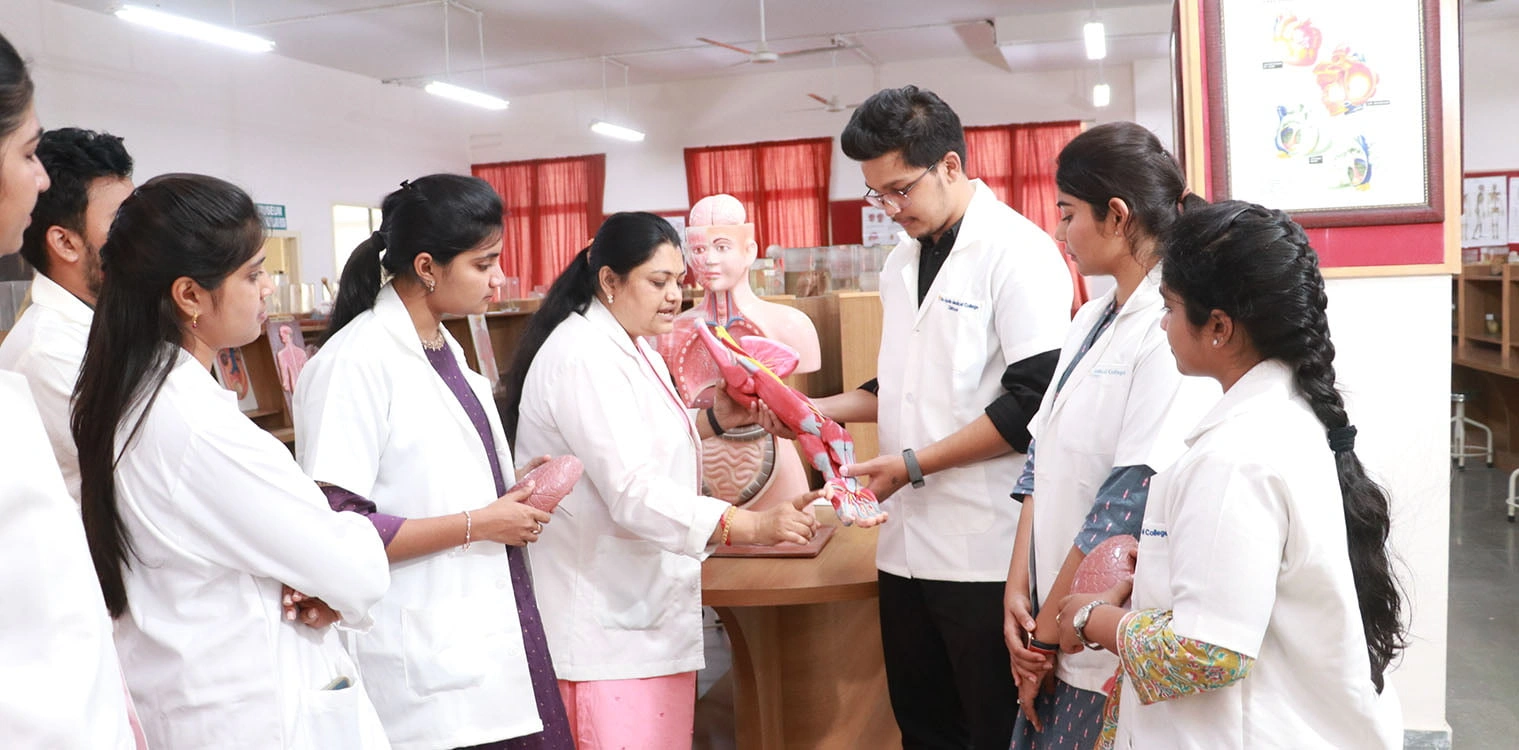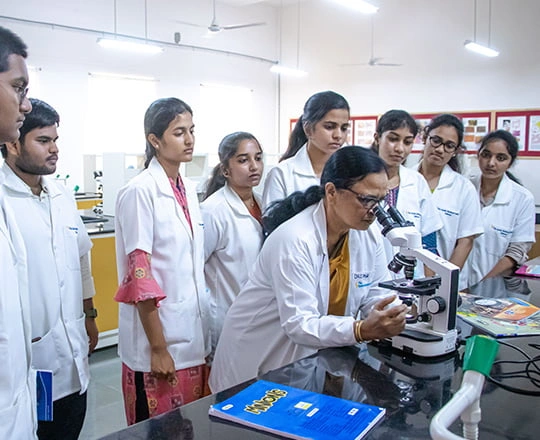COURSE OVERVIEW

The Master of Science in Medical Imaging Technology (M.Sc. MIT) is a postgraduate program designed to equip students with advanced knowledge and practical skills in diagnostic imaging modalities. The course integrates fundamental sciences, clinical applications, and hands-on training with modern imaging equipment, preparing graduates for specialized roles in healthcare, research, and academia.
This two-year program focuses on the in-depth study of radiological imaging technologies including Magnetic Resonance Imaging (MRI), Computed Tomography (CT), Ultrasound, Digital Radiography, Mammography, Nuclear Medicine, and Interventional Radiology. Emphasis is also laid on image processing, radiation safety, quality assurance, and patient care.
PROGRAMME OBJECTIVES
- To equip students with advanced knowledge of key medical imaging modalities (e.g., X-ray, MRI, CT, PET).
- To provide hands-on training with state-of-the-art imaging systems.
- To foster innovation in imaging technologies for healthcare challenges.
- To develop research and analytical skills for impactful discoveries.
- To promote ethical practice and compliance with regulatory standards.
- To integrate emerging technologies like AI and data analytics into imaging.
Program Highlights
- Advanced Curriculum: Comprehensive syllabus covering high-end imaging modalities including MRI, CT, Ultrasound, Digital Radiography, Mammography, and Nuclear Medicine.
- Hands-on Training: Extensive practical exposure in well-equipped radiology departments, simulation labs, and diagnostic centers using state-of-the-art imaging equipment.
- Research Focus: Encourages clinical and technical research projects, fostering innovation in diagnostic imaging and radiologic sciences.
- Interdisciplinary Learning: Integrated approach combining anatomy, physiology, pathology, and physics with imaging technology to strengthen clinical correlation.
- Expert Faculty: Guidance from experienced radiologists, technologists, physicists, and healthcare professionals.
- Clinical Rotations: Structured clinical postings in multispecialty hospitals for real-time experience in various imaging departments.
- Workshops & Seminars: Regular academic enrichment through CME programs, guest lectures, national conferences, and hands-on workshops.
- Technology Integration: Training in image post-processing, 3D reconstruction, PACS (Picture Archiving and Communication System), and emerging technologies like AI in radiology.
- Career-Readiness: Emphasis on communication skills, ethics, patient care, and teamwork to prepare students for professional roles in healthcare and industry.
- Global Opportunities: Eligibility for higher studies, certifications, and employment in national and international healthcare institutions.
Programme Curriculum
- SEMESTER I + -
Course Code Course Name Periods per week
Credits Hours per week L T P MITT6501 Specialised radiographic Positioning 3 1 0 4 4 MITT6502 Instrumentation of conventional & specialised radiology equipment 3 1 0 4 4 MITT6503 Principles of Radiographic Exposure 3 1 0 4 4 MITT6601 Biostatistics and Research Methodology 3 0 0 3 3 MITL6501 Clinical Skills -1 0 0 16 8 16 — Mentoring 0 0 0 0 1 — Library 0 0 0 0 1 — Extra-Curricular Activity (sports & Club Activities) 0 0 0 0 2 — Co-Curricular Activity (Seminars/Case discussions) 0 0 0 0 1 — Total 12 3 16 23 36
- SEMESTER II + -
Course Code Course Name Periods per week
Credits Hours per week L T P MITT6504 Advanced tech and Instrumentation of Ultrasound 3 1 0 4 4 MITT6505 Advanced tech and Instrumentation of Computed Tomography 3 1 0 4 4 MITT6506 Specialised Radiographic Procedures 3 1 0 4 4 MITT6602 Ethics and Pedagogy 3 0 0 3 3 MITL6502 Clinical Skills -2 0 0 16 8 16 — Mentoring 0 0 0 0 1 — Library 0 0 0 0 1 — Extra-Curricular Activity (sports & Club Activities) 0 0 0 0 2 — Co-Curricular Activity (Seminars/Case discussions) 0 0 0 0 1 — Total 12 3 16 23 36
- Semester III + -
Course Code Course Name Periods per week
Credits Hours per week L T P MITT7507 Advanced tech. & Instrumentation of MRI 3 1 0 4 4 MITT7508 Care of patients in Diagnostic Radiology 3 1 0 4 4 MITT7509 Nuclear medicine imaging technique 3 1 0 4 4 MITP7501 Research Project and Viva 0 0 3 3 3 MITL7503 Clinical skills 3 0 0 16 8 16 — Mentoring 0 0 0 0 1 — Library 0 0 0 0 1 — Extra -Curricular Activity (sports & Club Activities) 0 0 0 0 2 — Co-Curricular Activity (Seminars/Case discussions) 0 0 0 0 1 — Total 9 3 19 23 36
- Semester IV + -
Course Code Course Name Periods per week
Credits Hours per week L T P MITT7510 Interventional Radiology Techniques 3 1 0 4 4 MITT7511 Radiation Safety and Protection 3 1 0 4 4 MITT7603 Management of Healthcare Organisations 3 0 0 3 3 MITP7502 Research Project and Viva 0 0 4 4 4 MITL7504 Clinical skills 4 0 0 16 8 16 — Mentoring 0 0 0 0 1 — Library 0 0 0 0 1 — Extra-Curricular Activity (sports & Club Activities) 0 0 0 0 2 — Co-Curricular Activity (Seminars/Case discussions) 0 0 0 0 1 — Total 9 2 20 23 36
PROGRAMME FEE AND SCHOLARSHIPS
| One-Time Fee | Admission Fee | ₹ 10,000 |
| 1st Year | Tuition Fee + Annual Recurring Fee | ₹ 1,65,000 + ₹ 13,000 |
| 2nd Year | Tuition Fee + Annual Recurring Fee | ₹ 1,65,000 + ₹ 13,000 |
| Total Course Fee | ₹ 3,66,000 |
Scholarship is available for eligible students
Admissions are conducted in:
University Quota: Admissions are based on eligibility criteria set by The Apollo University (TAU). Candidates must meet the academic and qualification standards prescribed by the university to be considered for admission into the M.Sc. Medical Imaging Technology program.
EMPLOYABILITY AREAS
Graduates of M.Sc. Medical Imaging Technology are equipped to work in a variety of healthcare, academic, and research settings, including:

- Multispecialty Hospitals & Diagnostic Centers
- Advanced Radiology Departments (Public & Private)
- Imaging Equipment Manufacturing Companies
- Medical and Allied Health Science Colleges
- Clinical Research Organizations (CROs)
- Public Health Institutions and Government Agencies
- Tele-radiology and AI-Based Imaging Startups
- Quality Control and Radiation Safety Divisions
- Healthcare IT and PACS Management Firms
FAQs
-
What is the scope of M.Sc. Medical Imaging Technology?
+ -M.Sc. Medical Imaging Technology programme trains you in MRI, CT, ultrasound and other scans, with jobs in hospitals, research, teaching and healthcare tech.
-
Is M.Sc. Medical Imaging Technology a good course?
+ -Yes, it’s a good programme that builds skills in operating imaging equipment and offers careers in hospitals, labs and diagnostic centres.
-
Who is eligible for M.Sc. Medical Imaging Technology?
+ -You need a B.Sc. in Medical Imaging Technology, Radiography, or similar allied health field to apply.
-
Which medical course is best without NEET?
+ -Courses like B.Sc. or M.Sc. Medical Imaging Technology and other paramedical courses can be pursued without NEET.
-
What is the role of medical imaging technology?
+ -The role of medical imaging technology includes body scans like X-rays and MRIs to help doctors diagnose and treat diseases.

